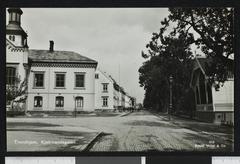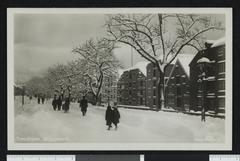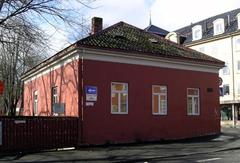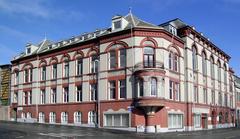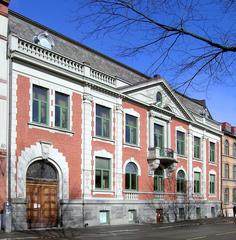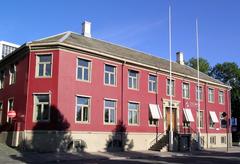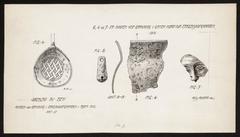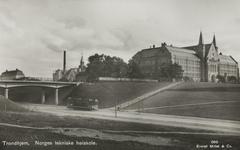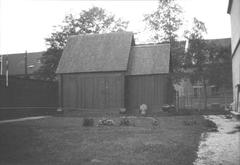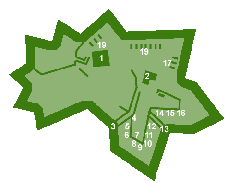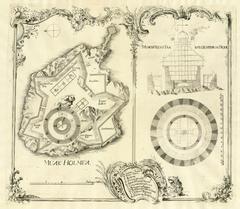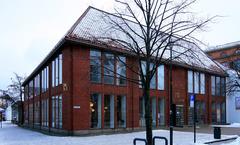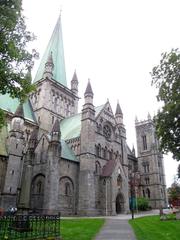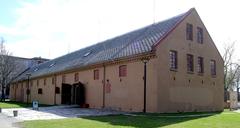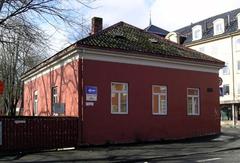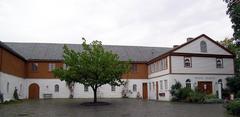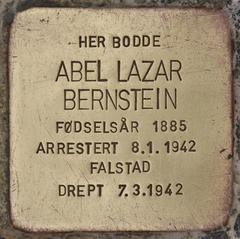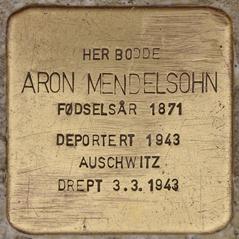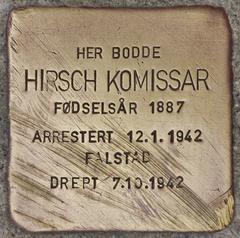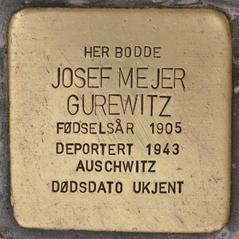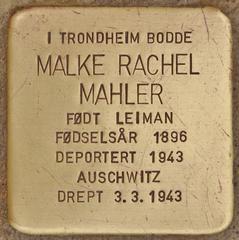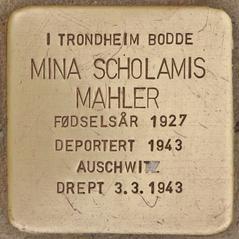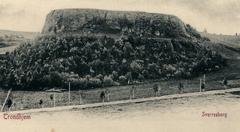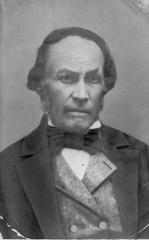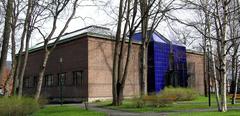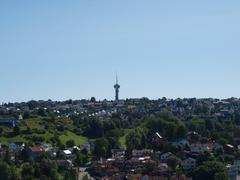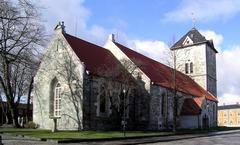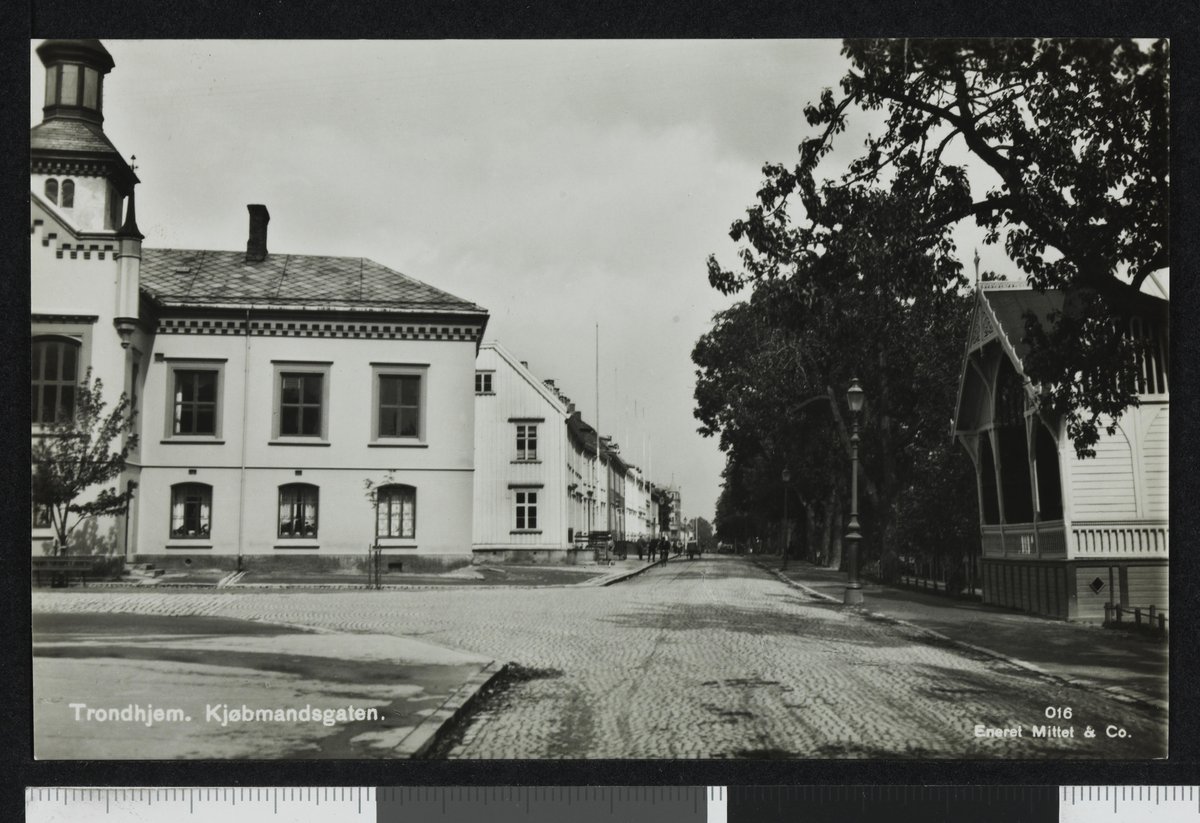
Kjøpmannsgata Trondheim: Visiting Hours, Tickets, and Travel Guide
Date: 15/06/2025
Introduction: Trondheim’s Historic Merchant Street
Kjøpmannsgata, or “Merchant’s Street,” is a living testament to Trondheim’s rich mercantile and urban legacy. Stretching along the scenic Nidelva River in the heart of Trondheim, Norway, this vibrant thoroughfare weaves together over a millennium of history, from medieval trade to contemporary arts and culture. Its colorful wooden warehouses, architectural innovations, and lively cultural scene make it an essential destination for visitors seeking to explore both Trondheim’s past and its creative present (Visit Norway, Life in Norway).
This guide provides everything you need to make the most of your visit, including historical insights, practical details on visiting hours and accessibility, ticket information for key venues, travel tips, and highlights of local attractions, events, and cultural experiences.
Table of Contents
- Historical Overview and Urban Development
- Architectural Heritage and Preservation
- Contemporary Culture and Events
- Visitor Information and Accessibility
- Getting There and Transportation
- Key Attractions and Experiences
- Shopping, Dining, and Local Tips
- FAQ: Your Questions Answered
- Conclusion and Further Resources
- References
Historical Overview and Urban Development
Origins and Early Development
Trondheim, founded as Nidaros in 997 CE, quickly established itself as a commercial powerhouse due to its strategic riverside location. Kjøpmannsgata’s name reflects its original function—“Merchant’s Street”—serving as the city’s commercial backbone from the Middle Ages onward. Archaeological discoveries, including medieval cemeteries beneath the street, are evidence of centuries of continuous activity (no.wikipedia.org).
The Cicignon City Plan
The catastrophic city fire of 1681 prompted King Christian V to commission Generalmajor Johan Caspar von Cicignon to redesign Trondheim. His innovative Baroque-inspired plan introduced wide, straight streets as firebreaks, with Kjøpmannsgata as a principal axis. This urban design not only protected the city’s valuable port warehouses from subsequent fires but also shaped the cityscape we see today (lpsphoto.top).
Architectural Heritage and Preservation
Timber Warehouses and Urban Landscape
Kjøpmannsgata is renowned for its continuous row of timber warehouses (brygger) along the Nidelva. Many of these buildings date to the 16th and 17th centuries and showcase traditional construction methods, including interlocked logs and timber piles driven into the riverbed. Cargo booms and wide corridors once allowed merchant ships to dock and unload goods directly into the warehouses, underscoring Trondheim’s mercantile identity (fourthdoor.co.uk).
Recent restoration projects, such as the revitalization of Kjøpmannsgata 15, have balanced historic preservation with modern use, incorporating glass facades and contemporary office spaces alongside original timber features (thon.no).
Preservation Efforts
Strict heritage regulations protect Kjøpmannsgata’s riverside warehouses. Since the 20th century, local authorities and community advocates have resisted proposals to replace these historical structures, ensuring their survival for future generations. Many warehouses are now adaptively reused as offices, galleries, and cultural venues, maintaining their architectural rhythm and historic character (trondheim.kommune.no).
Contemporary Culture and Events
K-U-K (Kjøpmannsgata Ung Kunst)
This contemporary art center, opened in 2021, offers over 1,000 square meters of exhibition space and hosts rotating exhibitions, workshops, and concerts. Its façade features a dramatic sculpture by local artist Kjell Erik Killi Olsen, reflecting the district’s blend of history and creativity (explanders.com).
Markets and Festivals
Seasonal events bring the street to life, including the Bryggerekka Bruktmarked flea market (Sundays, May–August) and the Bakklandet Vinfestival, which features wine tastings and concerts. These occasions highlight Trondheim’s vibrant community spirit (worldwildschooling.com, All Events).
Visitor Information and Accessibility
- Public Access: Kjøpmannsgata is an open, public street accessible year-round, 24/7, with no entrance fees required.
- Venue Hours: Shops, galleries, and cafés typically open from 10:00 to 18:00, but hours may vary—especially on weekends and holidays.
- K-U-K: Tuesday–Sunday, 11:00–18:00 (K-U-K official site).
- Olavshallen: Daily, 10:00–17:00 (high season); 10:00–14:00 (low season).
- Accessibility: The street is mostly flat and paved, suitable for wheelchairs and strollers. Some historic buildings may have steps or narrow entrances, but many modern venues are fully accessible.
- Events: For market and festival schedules, consult the Visit Norway website and local event calendars.
Getting There and Transportation
- By Foot: Kjøpmannsgata is centrally located in Trondheim’s Midtbyen district, a 10–15-minute walk from Trondheim Central Station.
- By Public Transport: The city’s AtB bus and tram network has stops nearby, including “Dronningens gate” and “Prinsens gate.” Tickets are available via the AtB app or kiosks (AtB official site).
- Cycling: Bike lanes run through the city, and Trondheim is famed for the Trampe bicycle lift in nearby Bakklandet (Heart My Backpack).
- From Airport: Trondheim Airport Værnes is around 30 km away. The airport bus or train to Trondheim Central Station is the most convenient route.
Key Attractions and Experiences
Architectural Walks
Stroll the length of Kjøpmannsgata to admire its colorful timber warehouses, intricate facades, and riverside views. The Old Town Bridge (Gamle Bybro) provides panoramic vistas of the street and leads to the picturesque Bakklandet district.
Art and Culture
- K-U-K Art Gallery: Showcases cutting-edge Norwegian contemporary art; free entry.
- Olavshallen: The city’s main concert hall, offering performances, dining, and tourist information (CityGuide Trondheim).
Nearby Landmarks
- Nidaros Cathedral: Northern Europe’s most significant Gothic cathedral, just a short walk away. Guided tours and combination tickets are available (Life in Norway).
- Bakklandet: Charming neighborhood with cobbled streets, colorful houses, and lively cafés.
Markets and Shopping
Enjoy the lively atmosphere of seasonal markets, and browse local boutiques and galleries for unique Norwegian crafts. Husfliden and other specialty stores offer regional handicrafts and textiles.
Shopping, Dining, and Local Tips
- Dining: Options range from traditional Norwegian fare at Baklandet Skydsstation to contemporary fine dining at To Rom & Kjøkken (Anders Husa). Cozy cafés like Dromedar Kaffebar and Hevd Håndverksbakeri are popular for coffee and pastries.
- Accommodation: Choose from upscale hotels like the Britannia or comfortable options like Scandic Bakklandet and Best Western Chesterfield (Heart My Backpack).
- Seasonal Advice: Late spring through early autumn offers the best weather and longest daylight, ideal for exploring on foot. Winter brings a cozy charm, with festive lights and events.
- Currency: Norwegian Krone (NOK). Credit/debit cards and mobile payments (Vipps) are widely accepted.
FAQ: Your Questions Answered
Q: Do I need a ticket to visit Kjøpmannsgata?
A: No, the street is open to the public free of charge. Some galleries or guided tours may have admission prices.
Q: What are Kjøpmannsgata’s opening hours?
A: The street itself is accessible 24/7. Most venues open 10:00–18:00; check individual sites for details.
Q: Is the area accessible for wheelchairs or strollers?
A: Yes, Kjøpmannsgata is mostly flat and paved, though some historic buildings may have limited access.
Q: How do I reach Kjøpmannsgata from the airport?
A: Take the airport express bus or train to Trondheim Central Station, then walk 10 minutes to Kjøpmannsgata.
Q: Are guided tours available?
A: Yes, several local companies and the tourist office offer walking tours that include Kjøpmannsgata and nearby attractions.
Q: Where can I find tourist information?
A: At Olavshallen, Trondheim Torg shopping center, and the Visit Trondheim office on Nordre gate.
Conclusion and Further Resources
Kjøpmannsgata stands as a dynamic crossroads of Trondheim’s historical legacy and contemporary culture. Its preserved timber warehouses, vibrant arts venues, and dynamic events offer visitors a multifaceted experience—whether you’re tracing the city’s mercantile past, exploring cutting-edge art, or simply enjoying a riverside stroll. With pedestrian-friendly paths, accessible venues, and proximity to major sites, Kjøpmannsgata is an indispensable part of any Trondheim itinerary.
For up-to-date information on exhibitions, market days, and travel tips, download the Audiala app, follow official Trondheim tourism channels, and explore further articles on this unique Norwegian destination.
References
- Kjøpmannsgata (Trondheim) Wikipedia
- Life in Norway: Trondheim Travel Guide
- Visit Norway: K-U-K | Kjøpmannsgata Ung Kunst
- Trondheim Kommune: Vitalisering av Kjøpmannsgatebryggene
- Thon Properties: Restoration of Historic Waterside Warehouse in Trondheim
- Heart My Backpack: Things to Do in Trondheim
- All Events: Bakklandet Vinfestival 2025
- lpsphoto.top: Trondheim Kjøpmannsgata
- fourthdoor.co.uk: Trondheim Warehouses
- explanders.com: Kjøpmannsgata Ung Kunst’s Hanging Sculpture
- worldwildschooling.com: Things to Do in Trondheim
- CityGuide Trondheim: Visit Trondheim
- Wanderlog: KUK Kjøpmannsgata Ung Kunst
- Anders Husa: Where to Eat in Trondheim
